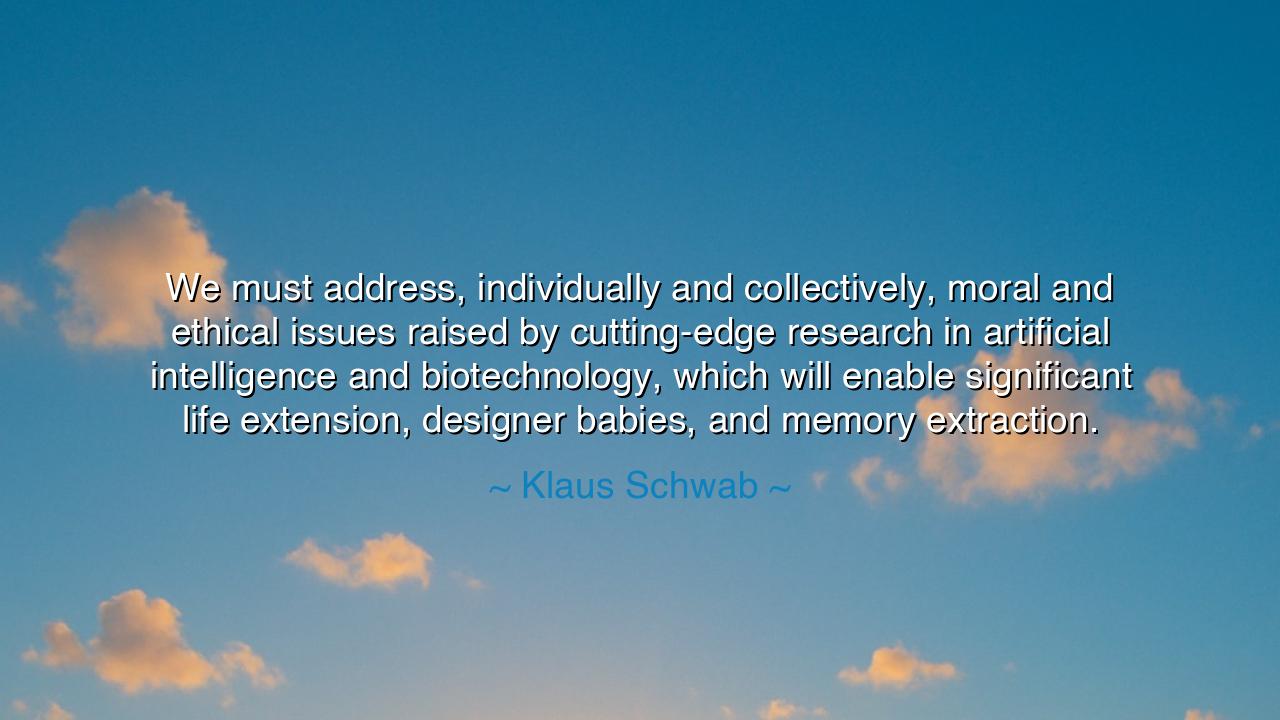
We must address, individually and collectively, moral and ethical
We must address, individually and collectively, moral and ethical issues raised by cutting-edge research in artificial intelligence and biotechnology, which will enable significant life extension, designer babies, and memory extraction.






The modern philosopher of progress, Klaus Schwab, founder of the World Economic Forum and a chronicler of the Fourth Industrial Revolution, once declared: “We must address, individually and collectively, moral and ethical issues raised by cutting-edge research in artificial intelligence and biotechnology, which will enable significant life extension, designer babies, and memory extraction.” These words, though born in the laboratories and think tanks of our age, echo with the gravity of prophecy. They call to humanity as a voice from the watchtower, warning that the marvels we have created with our hands may soon test the very essence of our souls. For Schwab speaks not of machines or genes alone, but of the eternal question that confronts every civilization: Can we wield the power of gods without forgetting that we are human?
In his vision, artificial intelligence and biotechnology are the twin pillars of a new era — forces that promise to reshape the boundaries of life, death, and identity itself. Through them, we are learning to design the human body as once we designed tools and cities; to extend lifespan beyond the natural cycle; to edit the code of heredity; even to extract and store memory, the most sacred repository of human experience. Yet, with each discovery, the line between creation and creator grows ever thinner. Schwab’s warning is not against knowledge itself — for knowledge is sacred — but against recklessness, the folly of pursuing advancement without wisdom, of asking “Can we?” before asking “Should we?”
The origin of this quote lies in Schwab’s reflections on the Fourth Industrial Revolution, a term he coined to describe the merging of the physical, digital, and biological realms. In earlier revolutions, humanity conquered nature through steam, electricity, and computation. But now, man turns inward — not to conquer the earth, but to recreate himself. The ancient dream of immortality, the philosopher’s stone of the alchemists, the divine spark sought by mystics — all now seem within reach through science. But here lies the danger: when man becomes his own experiment, when he alters the fabric of life itself, he must be guided by more than ambition; he must be guided by ethics, by reverence for life and its mysteries.
History has already whispered warnings of what happens when knowledge runs ahead of conscience. In the mid-twentieth century, during the Manhattan Project, scientists unlocked the atom’s power — a discovery that promised energy beyond measure but delivered also the terror of the atomic bomb. Those same minds who sought to illuminate the world found themselves creators of destruction. Like Prometheus, they stole fire from the heavens and were burned by its light. Schwab’s words remind us that we stand once again on such a precipice — only this time, the power we wield is not to destroy cities, but to reshape the human being itself. The moral stakes are no less great, and perhaps greater still.
The ancients understood this truth through myth and parable. The story of Icarus speaks eternally: the young man, in his yearning for the skies, flies too close to the sun with wings of wax and feathers, crafted by the genius of Daedalus. His fall is not a failure of skill, but of humility. So too must we beware the arrogance of unbridled innovation. Designer babies, genetic manipulation, artificial intelligence that may surpass human thought — these are wings of our own making, dazzling and perilous. Without moral wisdom, the wax will melt, and the fall will come swiftly.
Yet Schwab’s message is not one of fear; it is a call to stewardship. “We must address, individually and collectively,” he says — meaning that the burden of ethics cannot rest on scientists alone, nor on governments, nor on philosophers, but upon all humanity. Each person, in their choices, in their values, contributes to the moral direction of this new age. Collectively, we must build a framework of conscience strong enough to guide our creations. Individually, we must awaken a sense of responsibility equal to our power. The wisdom of the ancients — compassion, restraint, reverence for life — must walk hand in hand with the discoveries of the moderns.
The lesson, then, is this: progress must be married to purpose, and knowledge must serve the higher good. Let science not be divorced from spirit, nor technology from morality. Let every new discovery be weighed not only in what it achieves, but in what it preserves — the dignity of life, the balance of nature, the freedom of the human soul. Ask not how far we can go, but who we shall become if we go there. For the true measure of civilization is not how much it knows, but how wisely it uses what it knows.
Therefore, my children of the future, remember Klaus Schwab’s warning as a covenant: embrace innovation, but never without reflection; pursue progress, but never without compassion. When you stand before the wonders of artificial life or the secrets of the gene, pause and ask, “Does this uplift humanity, or diminish it?” For in that question lies the fate of your species. The tools you wield can build a paradise or a prison; the choice is yours. Let conscience be your compass, and wisdom your guide — so that in mastering creation, you do not lose the essence of the creator within you.






AAdministratorAdministrator
Welcome, honored guests. Please leave a comment, we will respond soon